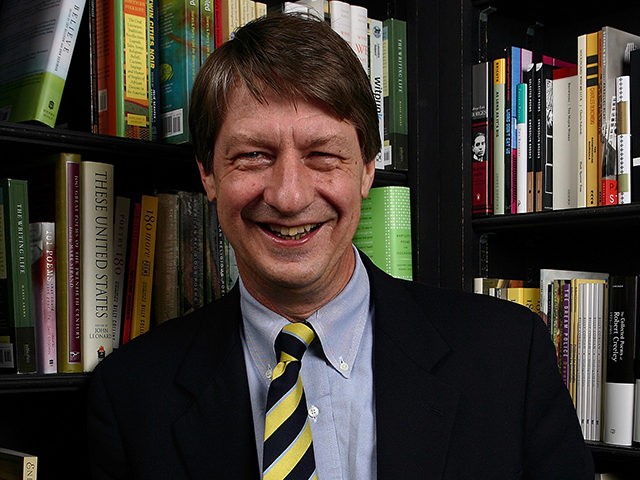“Giving money and power to government is like giving whiskey and car keys to teenage boys.” So wrote P.J. O’Rourke in his 1991 bestseller, Parliament of Whores. That was the essential O’Rourke: funny, irreverent, libertarian. O’Rourke, who died on February 15, at age 74, will always have a place in the pantheon of liberty-minded wits. And yet his critique was actually much larger than just the government—large as it is.
Born in Toledo, O’Rourke freelanced for a while in New York City, and then, in 1973, he became editor-in-chief of The National Lampoon, a magazine that was then the knifiest edge of humor.
In those days, the Lampoon was not obviously political or ideological. It was overtly oppositional. In its anarchic tone it mocked everyone and everything, from Richard Nixon to Third World peasants. (Many Lampoon staffers, and even more of its spirit, soon migrated to television, joining the TV show Saturday Night Live, which in its early John Belushi-phase was mostly equal-opportunity in its targeting.)
For his part, O’Rourke stayed in print, following in the path of his idol, H.L. Mencken (1880-1956), the legendary columnist and editor who gleefully ridiculed Christians, Communists, and all in between. Indeed, O’Rourke became the H.L. Mencken Fellow at the Cato Institute—a title that was as sincere as it was fake.

Author P.J. O’Rourke signs copies of his book “On The Wealth Of Nations” at Book Soup on February 5, 2007, in Los Angeles, California. (Michael Buckner/Getty Images)
Three decades ago, Parliament of Whores was about more than just the U.S. Congress; it was a takedown of the whole federal apparatus. As O’Rourke wrote, “The three branches of government number considerably more than three and are not, in any sense, ‘branches’ since that would imply that there is something they are all attached to besides self-aggrandizement and our pocketbooks.” And he added of the two political parties, “The Democrats are the party that says government will make you smarter, taller, richer, and remove the crabgrass on your lawn. The Republicans are the party that says government doesn’t work and then they get elected and prove it.”
In those days, O’Rourke’s voice was so fresh and compelling that even a reviewer for The New York Times had to admit that Parliament of Whores “Is a kind of unblinkered, often profane everyman’s guide to Washington and what Government tries to do. Instead of real villains it has a lot of Congressmen and bureaucrats who look foolish and social programs whose main impact is to pay the people who operate them and give moral satisfaction to those who urge them on.”
Yet O’Rourke was much more than just a skewerer of Big Government. He also emerged as a sharp critic of liberalism as a whole, fearful at the thought that it was reshaping our culture, even our civilization.
In O’Rourke’s lifetime, it was liberalism, not conservatism, that was winning the Gramscian battle for hegemony in our institutions. And so O’Rourke went on the attack, oftentimes dropping the guise of sly humor and instead picking up an un-velveted hammer. As he wrote in another of his books, Give War a Chance (1992): “At the core of liberalism is the spoiled child—miserable, as all spoiled children are, unsatisfied, demanding, ill-disciplined, despotic and useless. Liberalism is a philosophy of sniveling brats.”
Those brats, O’Rourke continued, would grow up to be even more of a menace: “There is nothing more mealy-mouthed, bullying, irresponsible and victimized than a well-coddled self, especially if it belongs to a liberal.”
We might pause over some of those well-chosen words: Simultaneously, liberals feel victimized and bullying. So here we see the liberal-left-progressive dynamic: I’m a victim, so you must be cancelled. Even, I’m a victim, so we must shut down free speech.
In the same passage, O’Rourke added, “The liberal is continually angry, as only a self-important man can be, with his civilization, his culture, his country and his folks back home.”
So, in those words from three decades ago, we can see an early critique of what was then called political correctness, and which we now know in its even more metastatic form as wokeness. Whiteness is a disease, masculinity is toxic, America is evil—by now we all know the drill.
Today, every conservative, libertarian, and constitutionalist has figured out that the dominant institutions in America—the media, universities, the foundations, even many corporations—are controlled by the left.
For his part, O’Rourke was a pundit, not a powerbroker, and so there was nothing he could do directly to thwart this progressive takeover. And yet from his writings, opponents of hegemonic progressivism—the counter-woke culture—have drawn great inspiration.
And they always will, because the desire for freedom—and a few laughs—is written on the human heart.

COMMENTS
Please let us know if you're having issues with commenting.